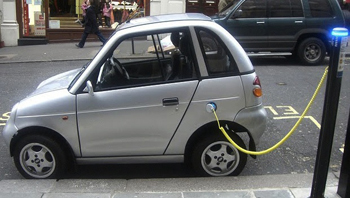 GREENVILLE, S.C. — Two years after an advisory committee in Greenville helped develop sustainable practices and cut carbon emissions, the city of Greenville is taking the first steps towards a greener future.
GREENVILLE, S.C. — Two years after an advisory committee in Greenville helped develop sustainable practices and cut carbon emissions, the city of Greenville is taking the first steps towards a greener future.
"The Greening of Greenville initiative is a public-private partnership between the City of Greenville and GE, Duke Energy, Hubbell Lighting, Enterprise Car Rental and Thurso Power. It is part of the City’s Greener Greenville plan to incorporate sustainable measures into the city’s operations and the community as a whole. The measures address energy and buildings, mobility, recycling and waste management and natural systems within the city. The goals are to reduce energy usage, improve community connectivity and encourage conservation of our resources,” said Doug Webster, chair of the Green Ribbon Advisory Committee.
The Greening of Greenville includes mixing energy incentives such as an extensive municipal recycling program and bicycle lane installation, using a network of electric vehicles and implementing LED-street lights, in addition to smaller changes.
The little changes through the 197 facilities in the building portfolio and across the city, will really add up, according to John Castile, city manager.
Energy audits, solar water heaters, rain gardens and energy-efficient light bulbs will help pave the way for larger green projects to turn the government sector of Greenville from having the second largest source of greenhouse gas emissions in the city to having a smaller carbon footprint, according to Castile.
One change that Castile sees is the new film on the windows of City Hall, which absorbs ultraviolet light in order to keep the room cooler without turning on the air conditioning. The film will save five to seven percent on utility bills.
Other additions included changing the lighting in the police department, community centers, all downtown parking garages and the fire stations to energy-efficient bulbs.
At the moment, Greenville is finishing the SmartBuilding Advantage pilot program with Duke Energy. The company is offering energy audits for commercial structures and incentives to pay for upgrades as part of the program.
In addition to the window film, the audit included daylight harvesting and upgrades to heating and air conditioning systems. The changes would reduce the buildings total energy consumption by 30 percent, according to Duke Energy spokesperson John McKenzie.
Another large project underway is the partnership of GE and Enterprise Rent-A-Car with the city. The program, WeCar, an electric car sharing program, launched two months ago and allows members to rent either a Nissan Leaf or Chevrolet Volt. With renting costing less than $12/hour and including fuel and insurance, people are using the vehicles to carpool to work or run errands around town.
With 16 electric car-charging stations around downtown and 40 in the region, the city hopes to eventually increase the rental usage to more than the 25 people currently using the program, according to Michael Kerski in a statement.
The last major idea at the moment is the new LED streetlights being tested along a five and a half mile stretch of road in downtown, according to GRAC. The LED streetlights are part of a plan to replace all 700 of the mercury vapor fixtures that are currently being used.
A chief goal for Greenville is to have more city facilities be LEED certified; currently there are 22 certified projects in Greenville County. However, city builders may not be taking the right approach, according to Scott Johnston, design partner for Johnston Fain.
With the city retrofitting facilities instead of building new ones, partial system replacements and piecemeal solutions will not help building owners get optimal results focusing on sustainable design, according to Johnston.
Johnston’s firm has a focus on creating a sustainable built environment, with a “Green Team” that meets to explore how to optimize project performance in this regard. Johnston’s firm was one of the first in the nation to focus on sustainable design.
The city will need to organize energy-efficient ideas that will pay for themselves within a practical time frame, according to Johnston.
“The plan [to reduce energy usage] will roll out over the next few years as City Council approves the measures and puts policies in place to encourage these improvements," said Webster.

